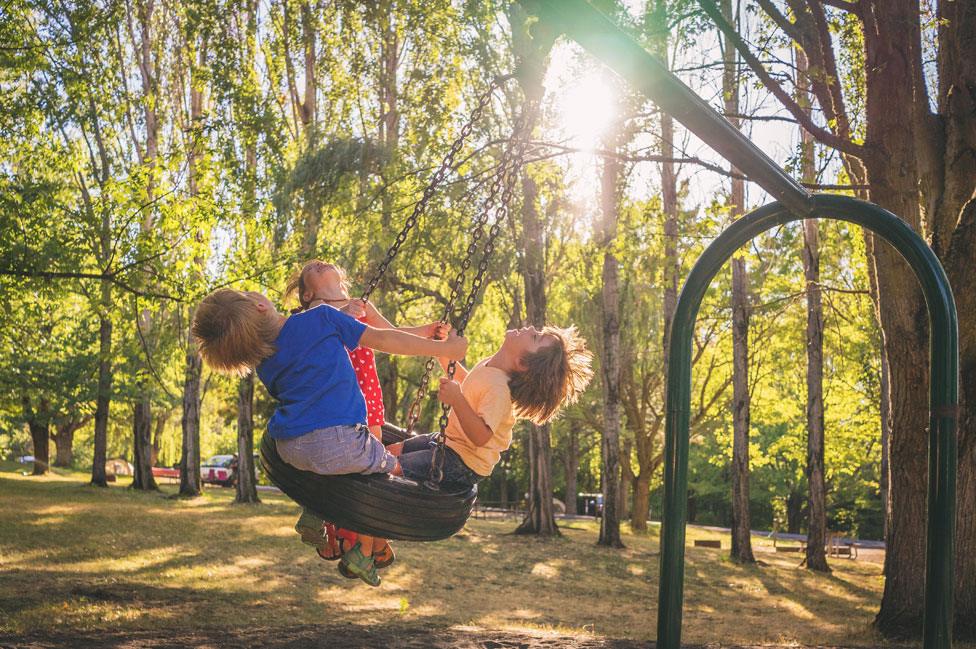Coronavirus: Should you let your children play with other children?
- Published

As more and more schools close around the world, parents are wrestling with what their children can and can't do. Should your child go out and play with friends? Or does social distancing mean an end to their playtime?
If Katherine Wilson could go back and change anything, she says she wouldn't have had that family dinner at the neighbours' home.
Two weeks ago, when Covid-19 was spreading throughout Italy but the government had not yet mandated that people stay in their homes, the mum of two teenagers in Rome got an invitation to a small dinner party with two other families.
"My husband and I thought oh we're in somebody's apartment, it's not like it's some big gathering," she tells the BBC.
At the time, Ms Wilson, an American writer who is married to an Italian, says her and many other mums were treating the recent school closures as an extended holiday.
"It's like: 'Oh this is great, it's kind of like a little vacation, let's go to that park we never get to go to.'"
But in hindsight, after seeing how the virus has ravaged the country, she says she wishes she had been more proactive about putting limits on her family's movements.
"It was kind of foolhardy to go. But it felt like saying no would have been kind of extreme."
A few days later, the Italian government issued a total lockdown. That means no parks, and no playdates.
"In a way the total lockdown is easier than the uncertainty of having to make decisions that were challenged by your kids, challenged by your friends," she says.
"There was a good bit of judgement, both for people who were considered too extreme, and people who were considered to be taking this too lightly."

The Wilson family
Around the world, many parents are finding themselves confused like Ms Wilson was, about what the rules are for playtime and socialisation.
On the one hand, governments may not have imposed lockdowns restricting people's movement. But on the other, health officials say social distancing is necessary to stop the spread of the disease.
Is a game of tennis okay? A trip to the local playground? A play date at a friend's house?
Keri Althoff, a professor of epidemiology at the Johns Hopkins Bloomberg School of Public Health in Baltimore, Maryland, says social distancing requires everyone - children and adults - to stay six feet (two metres) apart at all times. That means no sports like basketball or football.


EASY STEPS: How to keep safe
A SIMPLE GUIDE: What are the symptoms?
YOUR 'THIRD HAND': How do you clean your smartphone?
GETTING READY: How prepared is the US?
DOING GOOD: Kind Canadians start 'caremongering' trend

While there may be some low-contact games like tennis or hide and seek that children could play together, it's a tall order to ask young ones to self-regulate during vigorous play time.
"Nobody keeps space around each other at a playground- that's not the point of the playground," she says.
There is also evidence that the disease can live on surfaces for days, she says, so it is also best to avoid "high-touch surfaces", like playgrounds and sports equipment.
Although children usually only display mild or no symptoms of coronavirus, they can spread the virus to others.
That means that while your child and your child's friend may appear totally healthy, they could still pass the disease onto others in their community, including adults who may experience more serious symptoms.
"Parents have to take care of themselves right now too," Prof Althoff says.
Coronavirus: Why do we touch our faces and how can we stop doing it?
Local governments need to be clearer about what social distancing really means, says Dr Katherine Semrau, an epidemiologist at Ariadne Labs, a joint centre for health system innovation at Brigham and Women's Hospital and Harvard TH Chan School of Public Health in Boston, Massachusetts.
"What we do now impacts what we do in two, three, four weeks." she says.
Even if your community has not gone into lockdown, like they have in Italy, Dr Semrau says now is the time for people to take it upon themselves to "go to the minimum number of places for the minimum amount of time".
Prof Althoff says parents should anticipate more restrictions in the coming days, and make a plan with their children about how to handle it.
"What can be most distressing for families is when it feels like this happens all of a sudden. So parents, make a plan."
Both women say social-distancing doesn't mean anti-social, and stressed the importance of going outside and connecting with friends and family online.

How to practise social distancing and still have fun
Follow the guidance of your local health authority in terms of what kinds of activities are safe
Avoid playgrounds or other "high-touch" areas like toy stores or play areas
Go outside! Take nature walks and bike rides, and bring activities along that enrich the experience
Interact with friends and family over the internet. Let children use their imagination with one another by doing arts and crafts or playing pretend over video-chat

Angela Pyle, an assistant professor at the Ontario Institute for Studies in Education at the University of Toronto, who researches how children learn through play.
She says it's important to let children use their imagination and have unstructured free time so that they don't feel too cooped up.
"Often kids like to just play imaginary games, they like to just have little dolls or little animals or things, and they just play through these imaginative scenarios. And that kind of play works really well through FaceTime."
Prof Pyle has had to find ways to keep her own seven-year-old daughter entertained in Toronto, where community officials are advising everyone practice social distancing, and schools and daycare centres are closed.
"We will play in our home, we will go on walks through the neighbourhood, bike rides, scooter rides. Anything that gets us out of the house and a little bike rides and scooter rides, without going to parks where too many people congregate."
She says bringing things along, like clipboards and paper or post-it notes, have helped make these outdoor excursions more engaging for her young daughter.